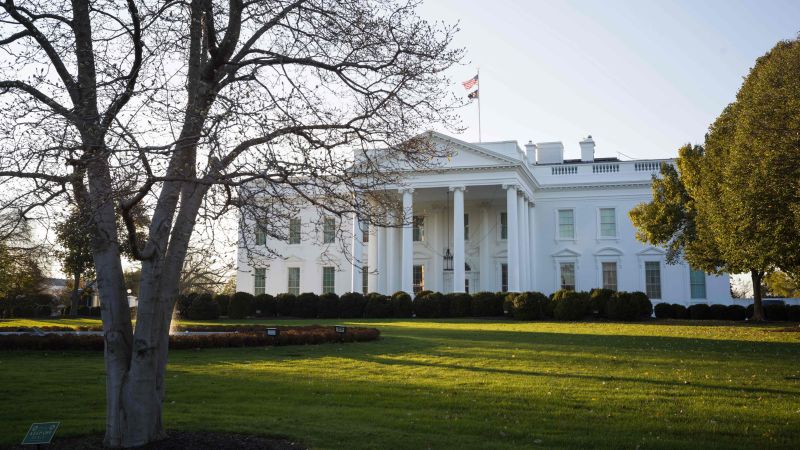Illinois Gov. J.B. Pritzker and Chicago Mayor Brandon Johnson confronted top White House officials late Sunday, demanding they take fast and concrete steps to address a migrant crisis they believe is about to reach a breaking point in the Windy City, according to two people on the call.
On a conference call they pushed for on short notice, the two Democratic leaders and aides laid out concerns about Texas Republican Gov. Greg Abbott ramping up the number of buses bringing migrants to the city, arguing that it could double the number of migrants there – currently about 15,000 – just as temperatures begin to drop in a city famous for its harsh winters.
White House intergovernmental affairs director Tom Perez, who was on the call along with White House chief of staff Jeff Zients, urged Chicago to follow the “best practices” put in place in New York, where new efforts have launched to try to help migrants obtain work permits. But that did little to quell concerns held by Pritzker and Johnson, who also observed New York City and state officials grapple with the arrival of thousands of migrants.
On Monday, Pritzker sent a letter addressed to President Joe Biden demanding that the federal government take over a coordinated response at the border, according to a copy obtained by CNN.
The White House has come under increasing criticism from local officials across the country over the growing number of migrants at the US-Mexico border, stressing relationships with Democratic allies nationwide. Now, the feud over the migrant crisis is drawing in a governor who is a major political ally of the president and has been one of the most active boosters of his reelection campaign.
It’s also bubbling up in a city that will host next year’s Democratic convention – an event that people involved already believe will be a magnet for even more migrants to be sent to the city by Republican governors.
“That sort of pace is unsustainable for us even a week from now,” said one person close to the Pritzker administration. “They need to know we are at a breaking point.”
Johnson did not sign the letter but was briefed on its contents and is supportive of the effort. In a mark of how frustrated Johnson was with the White House position, he had his own one-on-one follow-up call with Perez to stress the need for the federal government to do more – and finished that conversation not feeling that help was coming, according to a person briefed.
A White House aide confirmed the Sunday call but referred to it as “a productive conversation” that is part of ongoing engagement, including $46 million in grants to Chicago and to Illinois to support migrants who have arrived.
The aide cited the administration’s extensive efforts to increase border enforcement and expand work authorizations for those who have arrived, as well as 253,000 people who have been returned to 152 countries since May 12 – compared to 180,000 removed during the same period in 2019, under the Trump administration.
“Without the help of Congress, the administration has been taking action,” said White House spokesperson Angelo Fernández Hernández. “Meanwhile, House Republicans continue to block the reform the immigration system needs and the $4 billion we requested to address the immediate needs of DHS to safely and humanely manage the Southwest Border and support communities across the country. We will continue to work closely with Illinois and states and cities across the country.”
Chicago saw a record number of migrant buses arrive last week, said Beatriz Ponce de Leon, the Deputy Mayor of Immigrant, Migrant and Refugee Rights. More than 2,300 migrants are living on the floors of police stations and Chicago’s airports awaiting placement in shelters.
The White House has grown increasingly worried about Chicago, realizing the expected influx of migrants in the city, according to a source familiar with discussions. Late last month, Perez met with Johnson over an hour to discuss the ongoing migrant situation in Chicago, according to sources familiar with the meeting.
Jason Lee, a senior adviser to the mayor, told CNN that he feels the top aides in the White House do understand the level of crisis that Chicago is facing – and “we’re trying to figure out what are the ways we can work with the White House and the executive branch – knowing that it’s not sufficient, but we don’t want to turn away or miss support that is there.”
“It’s a fact that the federal government, from a resources standpoint has not matched us dollar for dollar – they’ve provided some funding, but not enough for what we’re dealing with,” Lee said.
The uptick in arrivals to cities in the US is tied to an increase in border crossings. Border Patrol apprehended more than 200,000 migrants crossing the US-Mexico border unlawfully in September, according to a Homeland Security official, marking the highest total this year and underscoring the ongoing challenges for the Biden administration amid mass migration in the region.
Migrants apprehended at the border can be placed in a fast-track deportation process, voluntarily return to Mexico, be detained, or be released from custody as they go through their immigration proceedings.
Venezuelans make up a large share of border crossings and the US generally can’t deport them because of frosty diplomatic relations with Venezuela. Mexico has agreed to take some, but it remains a complicated – and unique – challenge for the administration and for cities receiving them.
Abbott has also not coordinated with cities and states when busing migrants to destinations out of Texas, making it more difficult for those receiving migrants and prompting calls for the federal government to get involved.
“A single office with an identified leader must be assigned to work for the cities and states across the silos of government to manage the challenges we all face,” Pritzker wrote in his letter to the White House.
Pritzker argued this is about a city and state that have been left to fend for themselves, not trying to drum up anti-immigrant sentiment.
“We believe in the fundamental right of every human, especially those facing persecution, to find refuge and live with dignity in this great country of ours,” Pritzker wrote in the letter.
“Unfortunately, the welcome and aid Illinois has been providing to these asylum seekers has not been matched with support by the federal government. Most critically, the federal government’s lack of intervention and coordination at the border has created an untenable situation for Illinois,” he added.
“We’re running out of money – quickly,” added the person close to the Pritzker administration. “What we’ve gotten so far is Band-Aids – we need to stem the tide of the problem.”
The Department of Homeland Security has distributed millions of dollars to communities receiving migrants. Last week, the department announced an additional $12 million in funding, recognizing the financial strain on cities.
“SSP grants have provided critical support to communities receiving migrants and the need for this support is ongoing,” Homeland Security Secretary Alejandro Mayorkas said in a statement, referring to the funding through the Shelter and Services Program.
New York City Mayor Eric Adams, a Democrat, has continued to be highly critical, even with the administration approving one change he sought that eases the ability of Venezuelan nationals to get work permits.
He is headed to Latin America this week to call more attention to the crisis, and one of his closest advisers in City Hall, Ingrid Lewis-Martin, said in an interview with local New York television station WPIX over the weekend: “We need the federal government, the Congress, the Senate and the president to do their job, close the borders.”
While Pritzker and Johnson did not go that far, they rejected the idea that New York was handling the situation well.
In his letter, Pritzker called for several additional specific measures, including a significant increase in logistical coordination and data collection for people after they arrive in the country, more financial support for states and cities to provide social services including housing, and waivers of the state’s applications for federal support like Medicaid.
“The federal government must stop abdicating responsibility once CBP releases migrants into the interior of the country. Your administration has the capacity, resources and legal recourse to do this right now,” Pritzker wrote.
As it stands, Pritzker added, the people of Illinois “are carrying out for our entire nation the obligations to care for the ‘huddled masses yearning to be free’ who are so desperately in need of assistance.”
Read the full article here



